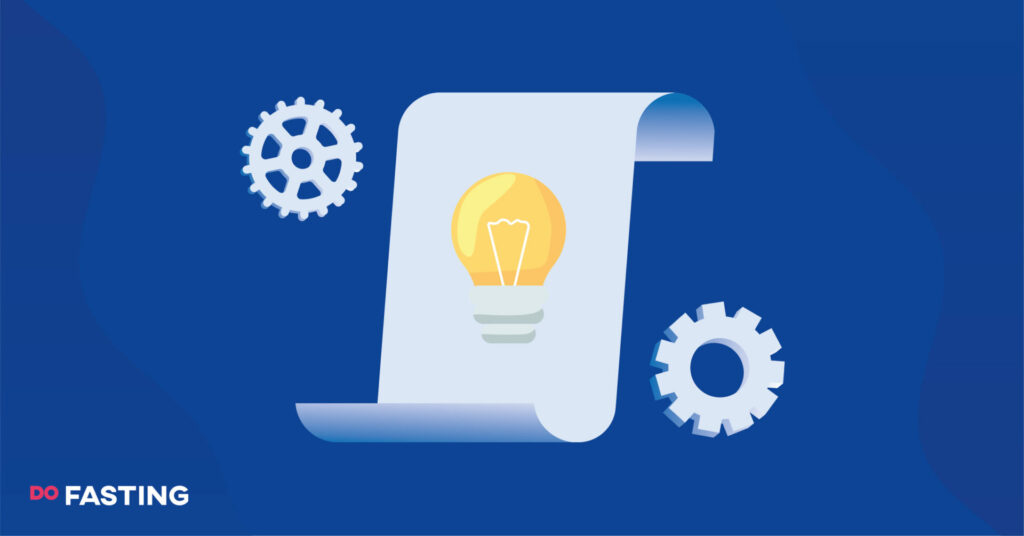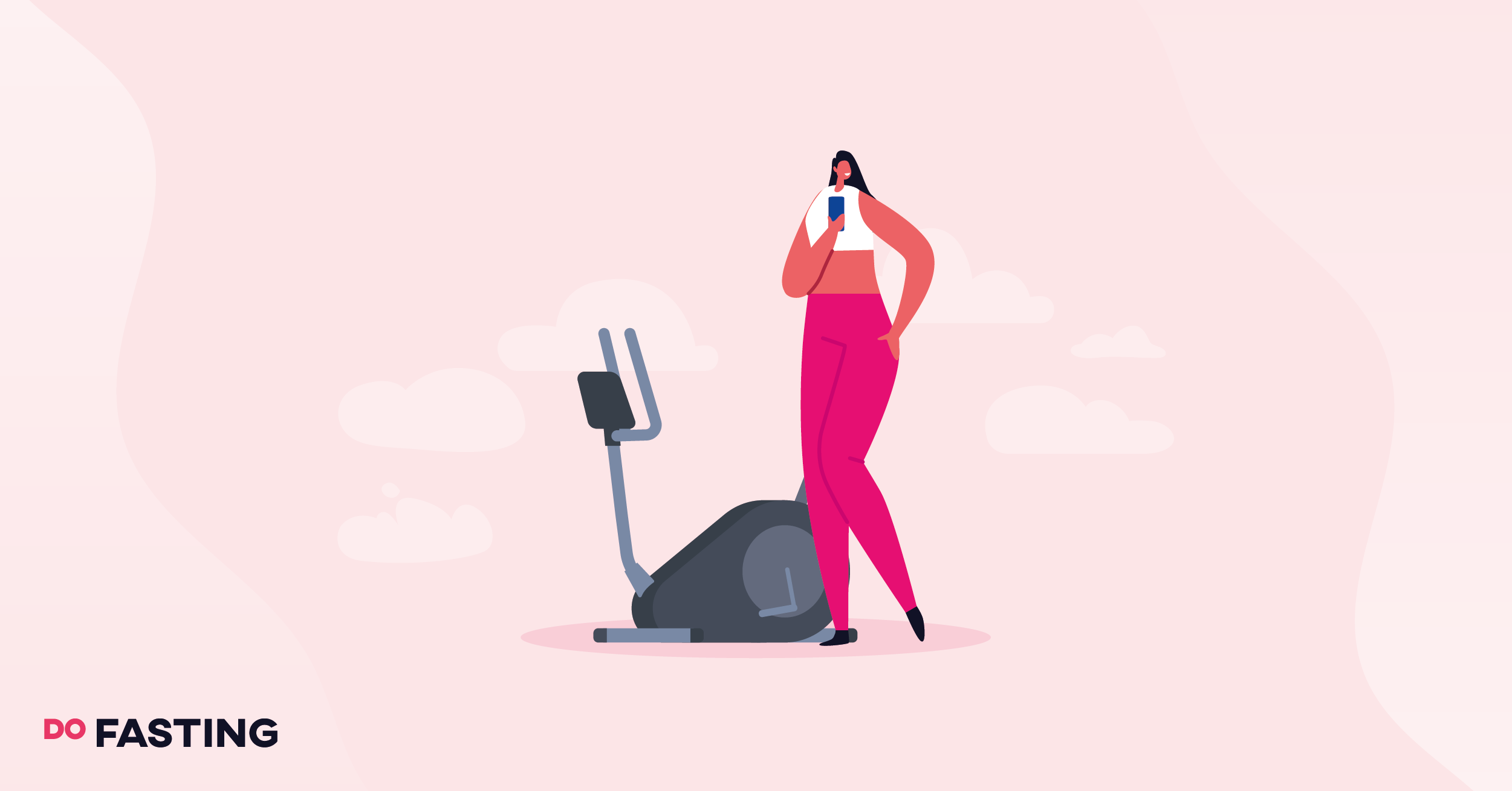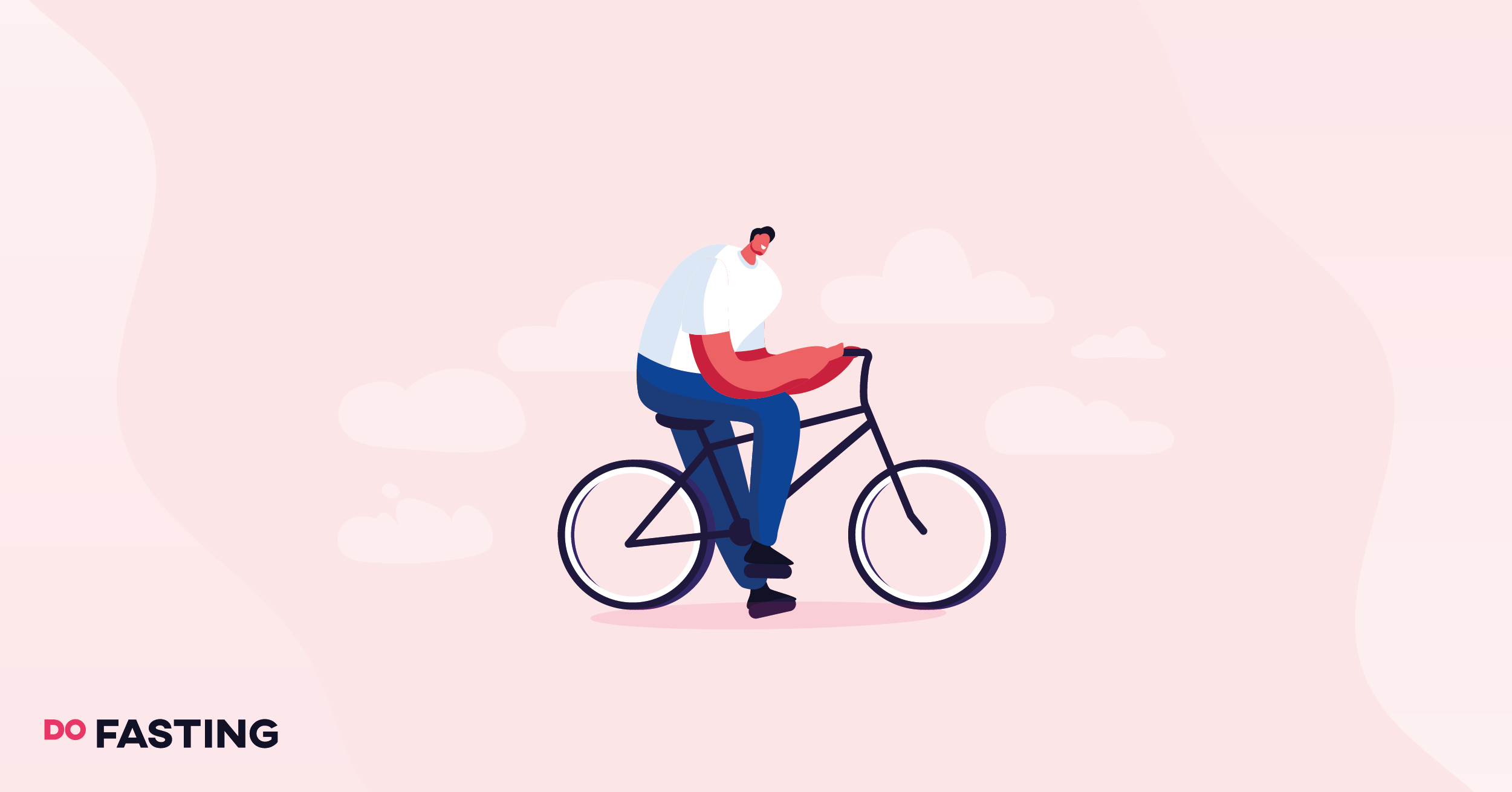Contents
Causes of Diarrhea After Fasting
You might experience diarrhea when your fast ends for several reasons. When you stop eating, your digestive system slows. When you return to eat as usual, many factors can disrupt the digestive process and upset your stomach.
Let’s look at five common causes of fasting-related diarrhea.
Take a
1-minute quiz
and discover how much weight you can lose with DoFasting!

Choosing the Wrong Foods
In many cases, the foods you consume to break your fast are the prime culprits of fasting diarrhea. Choosing the wrong foods for your sensitive, empty stomach can cause discomfort and diarrhea. It is essential to plan your first meal.
It’s best to avoid the following foods when you break your fast:
- High-fat foods like fatty cuts of meat, heavy cream, and high-fat dairy products
- Highly processed carbs like pastries, chips, and candy
- Food with a high sugar content
- Cruciferous vegetables
To properly break a fast, stick to gentle foods that don’t overwhelm your digestive system. It’s also best to choose healthy food to replenish essential nutrients and electrolytes. Focus on protein intake, healthy fats, and vegetables. Some prefer only to eat bland foods.
Examples include:
- Smoothies
- Bone broth
- Chicken broth
- Soups with easily digestible carbs
- Soft, starchy vegetables
- Poultry and fish
- Eggs
- Healthy fats like olive oil, avocado, and grass-fed butter
Certain Supplements
Many fasters take dietary supplements in the fasting window to maintain an adequate intake of vitamins and minerals. If you choose to, it is crucial to understand what kind of supplements you can have while fasting.
Unfortunately, some supplements can cause stomach problems and diarrhea, as the body struggles to digest certain nutrients on an empty stomach. The following supplements are best taken with food and should be avoided in the fasting routine:
- Magnesium
- Zinc
- Copper
- Curcumin
- Fat-soluble vitamins, including vitamins A, D, E, and K
- Amino acids
- Gummy multivitamins
Too Many Electrolytes
Taking electrolytes can prevent dehydration and help you maintain an electrolyte balance while you abstain from food. With electrolytes, it’s all about finding balance. They are essential to health, but taking too many can cause diarrhea during fasting.
Excess electrolytes on an empty stomach may be excreted through the gastrointestinal tract along with excess water, causing diarrhea. The electrolytes most likely to cause diarrhea are:
- Magnesium: High doses of magnesium from supplementation can result in diarrhea, abdominal cramping, and nausea.
- Sodium: Too much sodium makes you dehydrated and can trigger diarrhea, vomiting, and dizziness.
Coffee, Tea, and Other Caffeinated Drinks
Coffee, tea, and other caffeinated drinks can irritate the digestive tract, causing diarrhea, nausea, and abdominal cramps.
Caffeine is a natural stimulant. It stimulates the digestive system and speeds up the muscle contractions that allow waste to pass through the gastrointestinal tract. In doing so, consuming caffeine can have a laxative effect.
If caffeinated beverages are causing watery stools and other digestive discomforts, you might want to avoid them immediately after breaking your fast.
Artificial Sweeteners
During a fast, many people consume low-calorie and zero-calorie drinks to help sustain the fast. These drinks often contain zero-calorie sweeteners that can cause diarrhea. Many zero-calorie sweeteners belong to a group of poorly digested sugars called FODMAPs.
FODMAPs are associated with the triggering and worsening of gastrointestinal symptoms, including bloating, cramping, and diarrhea.
It’s better to substitute artificial sweeteners with natural sweeteners in moderate doses that won’t upset your health. Good examples include stevia and monk fruit.
Take a
1-minute quiz
and discover how much weight you can lose with DoFasting!

6 Home Remedies for Diarrhea After Fasting
Fear not—there are ways to mitigate and treat the loose stools after your fast. Try these tips to keep your body healthy when you end the fasted state.
1. Drink Water
With diarrhea, you lose a lot of fluids. Replenishing fluids is critical to staying adequately hydrated and preventing the dangerous side effects of dehydration. You must drink plenty of water to flush toxins and replace lost electrolytes and minerals.
Drink lots, and you will soon feel revitalized. You can get enough water by drinking a glass. You can also try oral rehydration solutions, but be careful—overconsumption can knock your electrolytes out of whack.
2. Avoid Foods High In Fiber
Following a low-fiber or low residue diet helps with diarrhea. In the ordinary diet, fiber plays a key role in regulating bowel movements. After a period of gut rest from food abstinence, a sudden influx of fiber can quickly cause increased stool frequency.
High-fiber food examples:
- Whole grains
- Beans and lentils
- Broccoli
Low-fiber food examples:
- Fish and poultry
- Eggs
- Potatoes without the skin
- Cooked vegetables like carrots and green beans
3. Avoid Breaking the Fast With Fatty, Greasy, and Spicy Foods
Fatty and greasy food contains saturated and trans fats that the body struggles to break down. When not absorbed properly, they travel to the colon, breaking down into fatty acids. This causes diarrhea or makes the symptoms worse.
Spicy foods are a top cause of food-induced diarrhea. Not everybody can tolerate strong spices at the best of times, which may be especially detrimental to your digestive system after a fast. Capsaicin, in particular, can irritate the digestive tract.
Avoid these items:
- Cheeseburgers
- French fries
- Fried chicken
- Pizzas
- Potato chips
- Curries
- Salsa
- Hot peppers
- Hot sauce
4. Eat Small and Frequent Meals
While you might be hungry after your fast, you mustn’t overeat.
Overeating can cause sudden blood sugar and insulin spikes, making you nauseous and jittery. Plus, consuming a large meal immediately after your fast can shock the digestive system, causing upset.
Preparing small meals can help you control your portion sizes and mitigate adverse effects.
If you’re unsure how to control your portion sizes, the DoFasting app can help. The delicious and easy-to-make recipes prevent diarrhea during your fast. Whether you’re fasting for health or religious reasons, DoFasting provides a personalized fasting program to get you there safely.
5. Take Probiotics To Help You Feel Better
Taking probiotics may help treat diarrhea by regulating the gut bacteria, restoring the good bacteria, and correcting an imbalance. This can encourage normal bowel function, decrease the duration of diarrhea, and speed up recovery.
Here’s a list of the best probiotics for leaky gut according to the HealthReporter.com
6. Avoid Strenuous Exercise
Although fasting helps you lose weight, it is vital to continue exercising to keep your body in shape. Working out enables you to lose fat and maintain muscle mass. That said, you must go easy on your body during and after a fast.
Strenuous exercise for long periods, specific exercises, in particular, may induce diarrhea and other gastrointestinal complaints. Generally, the primary cause is reduced or restricted blood flow to the intestines.
Activities commonly associated with it are:
- Running: Runner’s diarrhea is fairly common, especially in long-distance runners.
- Cycling
- Swimming
- Weightlifting
Side Effects of Diarrhea After Fasting
Experiencing diarrhea when you return to the eating window is not uncommon. Often, it is a mild symptom that you can treat at home. Sometimes, if left untreated, it can lead to more severe health conditions.
The greatest concern with diarrhea is dehydration. Ordinarily, the large intestine absorbs water from food intake. Diarrhea prevents this absorption and causes the body to excrete water in excess. Severe dehydration can be life-threatening if left untreated.
The following symptoms occur when dehydration from diarrhea reaches dangerous levels:
- Excessive thirst
- Urinating less
- Dark-colored urine
- Dizziness and lightheadedness
- Tiredness and fatigue
- Confusion
If you experience diarrhea and notice athe other symptoms listed above, you should speak to your doctor immediately to avoid complications.
When To See a Doctor
Most people will recover from diarrhea without complications. However, it can become an emergency. The following symptoms determine when to see a doctor:
- Your diarrhea lasts more than two days and doesn’t improve
- You have symptoms of dehydration, including thirst, lightheadedness, fatigue, extreme weakness, and little or no urination
- You have severe abdominal pain
- You have bloody or black, tarry stools
- You have a high fever
Take a
1-minute quiz
and discover how much weight you can lose with DoFasting!

Conclusion
Diarrhea during fasting is one of the less common side effects of the practice. Nevertheless, it’s likely to happen if you break your fast with the wrong foods or take too many electrolytes.
The good news is—you can manage and prevent fasting diarrhea with the right dietary choices. Try the simple remedies suggested in this article, and you can get the most out of intermittent fasting without disrupting your bowel movements.
See how DoFasting will improve your life
Find out what works for you with this 60-sec quiz approved by our experts and get your personal revolutionary fasting assistant.
Start the Quiz
This is an evidence-based article that includes scientific citations. DoFasting’s professional writers and editors prepared the content, which a team of medical experts verified to be accurate.














